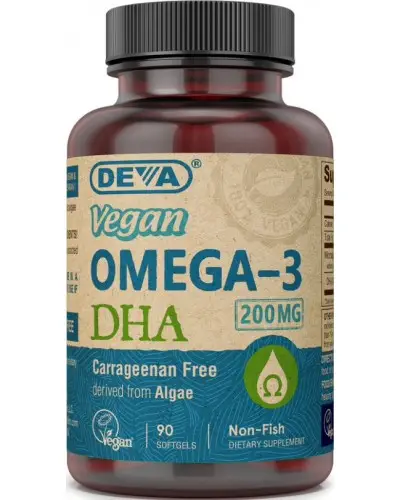Vegan Omega-3 DHA Softgels (Gelatin-free)
Vegan Omega-3 DHA Softgels (Gelatin-free) |
DHA is a long chain polyunsaturated omega-3 oil. It is an essential fatty acid, meaning that the body doesn't produce it in significant amounts by itself and it or its precursors must be obtained in the diet. DHA is one of the prominent essential fatty acids in the brain and in the retina.
DEVA Omega-3 DHA is 100% vegan, vegetarian and is registered by the Vegan Society, the non-profit organization that actually invented the word "vegan".
- SKU: 40002
- UPC: 895634000232
- Size: 90 Vegan Softgels
- Non-Animal Softgels
- New Carrageenan-Free Formula!
- DHA derived from Algae
- Triglyceride Form
- ConsumerLab.com Tested & Approved
- NO ANIMAL INGREDIENTS
- Vegan Society Registered
Supplement Facts Serving Size: 1 Vegan Softgel Serving Per Container: 90
| ||||||||||||||||||||||
Other Ingredients:Non-gmo tapioca starch, vegetable glycerin, purified water, mixed tocopherols, lemon oil, annatto color. (All from non-animal sources)
Recommended Use |
For adults, take one (1) Vegan softgel daily with food, or as directed by a health care professional.
Food Sensitivity |
Free of yeast, wheat, soy allergens, carrageenan, gluten, sugar, salt, hexane, dairy, egg, fish, shellfish; animal products, byproducts or derivatives.
Warnings |
Always consult your doctor before taking any dietary supplement.
Disclaimer |
*Information and statements regarding dietary supplements on our website have not been evaluated by the Food and Drug Administration and our products are not intended to diagnose, treat, cure, or prevent any disease. Individual results may vary. By using this site, you signify your assent to this Terms of Use Agreement. If you do not agree to the terms and conditions contained in this Terms of Use Agreement , you may not access or otherwise use this site and its contents.
*Information and statements regarding dietary supplements on our website have not been evaluated by the Food and Drug Administration and our products are not intended to diagnose, treat, cure, or prevent any disease. Individual results may vary. By using this site, you signify your assent to this Terms of Use Agreement. If you do not agree to the terms and conditions contained in this Terms of Use Agreement , you may not access or otherwise use this site and its contents. Privacy Policy
We are committed to ensuring that our website is accessible to individuals with disabilities. If you need assistance using our website please call us toll-free at 888-988-3382









